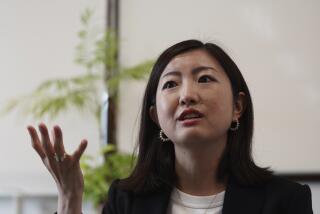Obedience, Politeness Come Before Typing and Word Processing : Accent Is on Tradition for Japanese Secretaries
Mariko Yamamura makes tea for her boss three times a day.
Tamami Nakabe complains that typing a business letter in Japanese often takes six times as long as typing the same letter in English.
Setsuko Murakami finds that she frequently must explain to Japanese employees what their American boss actually meant to say and must clear up confusion for foreign representatives who aren’t quite sure if the Japanese client just said yes or no.
Such is the lot of the secretary in Japan, said the three women, who are employed by Adia Personnel Services Inc. While the position of secretary can mean growing responsibilities, particularly in Japanese subsidiaries of foreign companies, many very traditional tasks remain part of the job, they said.
And despite Japan’s adoption of an “Equal Employment Opportunity Law” a year ago, advancement possibilities for women are still limited, they said.
Adia of Menlo Park, Calif., has brought the three Tokyo secretaries to the United States as part of Professional Secretaries Week, which concludes this Saturday, to see how their American counterparts work.
The duties of a secretary in Japan depend, among other things, on whether the company is a Japanese firm or the Japanese subsidiary of a foreign firm, according to Adia officials.
“The characteristics that a Japanese company might look for (in a secretary) often include a nice smile, pleasant personality, but even more important, the customary obedience and politeness that is expected of Japanese women,” said Mark DuRee of Adia’s Tokyo office. “These characteristics generally come before office skills such as typing and word processing.
“The foreign subsidiary usually looks for a higher skill level incorporated with English skill and the traditional customs required of Japanese women,” he said.
Japanese secretaries who work in foreign subsidiaries often are highly educated and are expected to perform a wide array of duties, said Nakabe, 27, who is a junior secretary for Nihon Philips, a subsidiary of Philips N.V. of the Netherlands. At Japanese companies, youth is prized over experience, she said.
“Working for a Japanese company is just making copies and serving tea,” said Murakami, 33, who works for the Japanese subsidiary of a large U.S. company that she declined to name.
Carolyn S. Hayes, immediate past president of Professional Secretaries International, said she was impressed during a trip last year to Japan at the knowledge of languages and business customs required of secretaries there.
“They have to have a much broader knowledge base than we do here,” said Hayes, who is administrative secretary to the vice president and general manager of Delco Electronics in Kokomo, Ind.
But, Hayes added, secretaries in Japan routinely serve tea because “the proper way to entertain a business client in Japan is to serve tea.” For her, “it’s not an issue. My boss gets his own coffee.”
Age and marriage can be stumbling blocks for Japanese women who want a secretarial career, said Yamamura, 39, who is married and has two children.
After age 35, women have trouble being hired by Japanese companies, said Yamamura, who works for the Bank of India. In addition, many women quit work when they marry or have children, or they work part time to cope with Japan’s high cost of living. Few companies provide any form of child care, she said.
“Anybody can work as long as they want,” Murakami said. “But they get a feeling, women who work for Japanese companies, that they have to leave the company at the age of 30 or 35.”
The Equal Employment Opportunity Law, which went into effect last April, asks employers to make an effort to treat women equally in hiring, promotion and other areas. But the law provides no punishment for firms that do not comply.
“It’s changing, but not really,” Nakabe said.
“I can see nothing so far,” Murakami said. “It’s very difficult to get to certain positions for the women of Japan. I don’t say it’s impossible, but it’s nearly impossible.”
More to Read
Inside the business of entertainment
The Wide Shot brings you news, analysis and insights on everything from streaming wars to production — and what it all means for the future.
You may occasionally receive promotional content from the Los Angeles Times.









